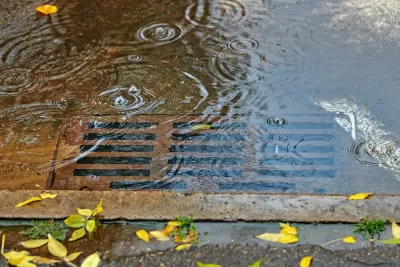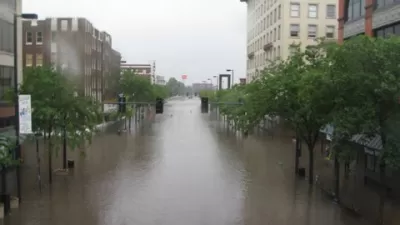Lack of gray and green infrastructure in the city’s densest communities, particularly in historically Black Southeast D.C., has led to higher amounts of flooding in those neighborhoods.

“A new University of Maryland study suggests that Washington, D.C.'s most socioeconomically vulnerable neighborhoods are less equipped to handle runoff from heavy rainfalls made more frequent by climate change,” according to a recent article by Maggie Haslam for Phys.org.
The study found that the city’s densest communities, particularly those in historically Black Southeast D.C., have fewer sewer pipes and lack green and gray infrastructure like permeable pavement, rain gardens, trees, and green roofs to adequately control and absorb the stormwater.
The higher prevalence of impervious surfaces in these neighborhoods creates excess runoff, which then overwhelms the outdated sewer structure, resulting in more frequent and severe flooding. Researchers attribute the disinvestment and infrastructure inequity to “racist planning practices dating to the 19th century that fueled inequitable infrastructure distribution and housing conditions across D.C.”
“The study … is one of the few to look at both above- and below-ground infrastructure through a socioeconomic lens, and the first to do so for the District of Columbia, with the aim of helping city planners funnel infrastructure dollars to neighborhoods most at risk,” Haslam reports.
FULL STORY: Stormwater hits D.C.'s poorest neighborhoods hardest, study finds

Planetizen Federal Action Tracker
A weekly monitor of how Trump’s orders and actions are impacting planners and planning in America.

San Francisco's School District Spent $105M To Build Affordable Housing for Teachers — And That's Just the Beginning
SFUSD joins a growing list of school districts using their land holdings to address housing affordability challenges faced by their own employees.

The Tiny, Adorable $7,000 Car Turning Japan Onto EVs
The single seat Mibot charges from a regular plug as quickly as an iPad, and is about half the price of an average EV.

Seattle's Plan for Adopting Driverless Cars
Equity, safety, accessibility and affordability are front of mind as the city prepares for robotaxis and other autonomous vehicles.

As Trump Phases Out FEMA, Is It Time to Flee the Floodplains?
With less federal funding available for disaster relief efforts, the need to relocate at-risk communities is more urgent than ever.

With Protected Lanes, 460% More People Commute by Bike
For those needing more ammo, more data proving what we already knew is here.
Urban Design for Planners 1: Software Tools
This six-course series explores essential urban design concepts using open source software and equips planners with the tools they need to participate fully in the urban design process.
Planning for Universal Design
Learn the tools for implementing Universal Design in planning regulations.
Smith Gee Studio
City of Charlotte
City of Camden Redevelopment Agency
City of Astoria
Transportation Research & Education Center (TREC) at Portland State University
US High Speed Rail Association
City of Camden Redevelopment Agency
Municipality of Princeton (NJ)





























